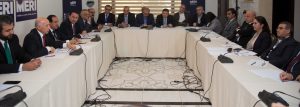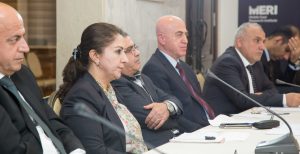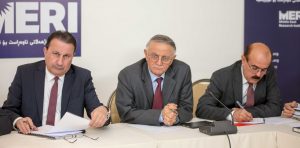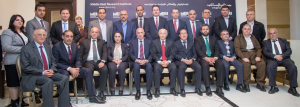As part of an ongoing project to promote good governance and democracy in the Kurdistan Region of Iraq (KRI) and to tackle the issue of the stalled political and parliamentary processes, the Middle East Research Institute (MERI) organised a special roundtable on Monday 6 March 2017 for political leaders to debate the reform of the electoral system.

The electoral system of the KRI has evolved over the past elections, but much of this evolution has been shaped by the local culture, history and power dynamics. Experience has shown that the current system suffers major shortcomings that need to be addressed urgently.

This is what was universally acknowledged by all attendants of this roundtable which included politicians and members of parliament from the following parties:
- Kurdistan Democratic Party
- Patriotic Union of Kurdistan
- The Change Movement
- Kurdistan Islamic Union
- Kurdistan Islamic Group
- Kurdistan Communist Party
- Kurdistan Toilers’ Party
- Kurdistan Socialist Democratic Party
- Iraqi Turkmen Front
- Turkmen Development Party
- Assyrian Democratic Movement
- Abnaa Al-Nahrain Party (Sons of Mesopotamia)
- Third Trend

Also present were members of the Independent High Commission for Election and Referendum in the Kurdistan Region.
There were clear differences in points of view about which components should be modified and how. The key components that attracted much of the discussion included:
- Defining constituencies: how should the electoral boundaries be drawn? Should the Kurdistan Region remain as a single constituency or be divided into multiple constituencies?
- Candidate listings: Should the electoral list of entities and candidates be closed, open or semi-open?
- The proportional system: how should candidates’ thresholds and numbers be determined? Is it possible to apply a mixed system (proportional- and majority-based)?
- The formulas for distributing remaining votes after initial seat allocations.
- Should a biometric system be used for voter registration?
- How to build confidence in the election process, maintain a reliable electoral register, and control forgery.
It was left for the representatives of each political party to return to their parties and help form clear views about each aspect of the electoral system before future agreements can be facilitated. It was also agreed that the local experts should be exposed to electoral systems and experiences of other democracies, particularly in Europe, before major changes are proposed for the KRI and a new electoral legislation (amendment) is adopted by the Parliament.
MERI has previously held a number of open debates for the political leaders, such as those held during the last two major annual conferences (MERI Forum 2015 and MERI Forum 2016), and for their parliamentarians, such as the recent workshop on 31 January 2017, in order to assist the parties in overcoming the current political and parliamentary deadlock.

* * * * *
About MERI: The Middle East Research Institute is Iraq’s leading policy-research institute and think tank. It is an independent, entirely grant-funded not-for-profit organisation, based in Erbil, Kurdistan Region. Its mission is to contribute to the process of nation-building, state-building and democratisation via engagement, research, analysis and policy debates.
MERI’s main objectives include promoting and developing human rights, good governance, the rule of law and social and economic prosperity. MERI conduct high impact, high quality research (including purpose-based field work) and has published extensively in areas of: human rights, government reform, international politics, national security, ISIS, refugees, IDPs, minority rights (Christians, Yezidis, Turkmen, Shabaks, Sabi mandeans), Baghdad-Erbil relations, Hashd Al-Shabi, Peshmarga, violence against women, civil society. MERI engages policy- and decision-makers, the civil society and general public via publication, focused group discussions and conferences (MERI Forum).

